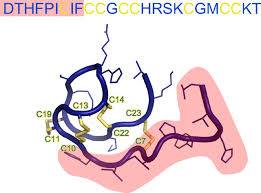Hepcidin in recent years, Knowledge has increased about hepcidin and its role in the absorption and movement of iron in the body which has started to provide a more functional view of iron metabolism. Hepcidin is a pivotal regulator of iron metabolism because it controls the efflux of iron from enterocytes, hepatocytes, and macrophages by internalization and degradation of the iron exporter (ferroportin), and also regulates the plasma iron level. Hepcidin is upregulated in response to an increase of body iron stores or the onset of infection and is downregulated by anemia or hypoxia, while it is also an acute phase reactant induced by inflammation that shows antimicrobial activity. The discovery of hepcidin and further understanding of how it inhibits the movement of iron and is itself regulated may eventually help clinicians better evaluate a patient’s iron status and may assist in more effective, efficient treatment for anemia of chronic disease.
